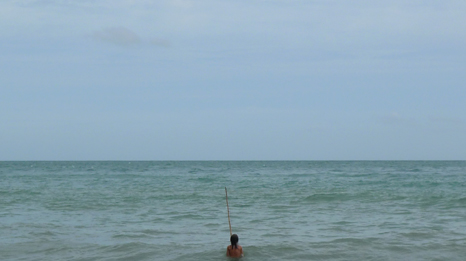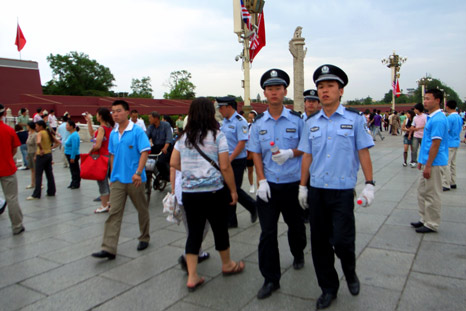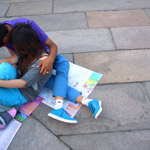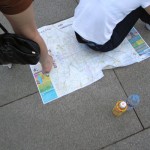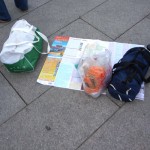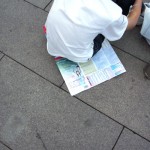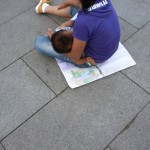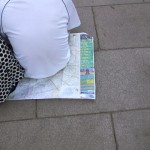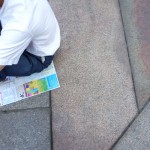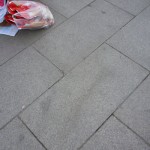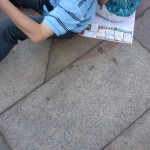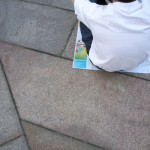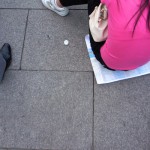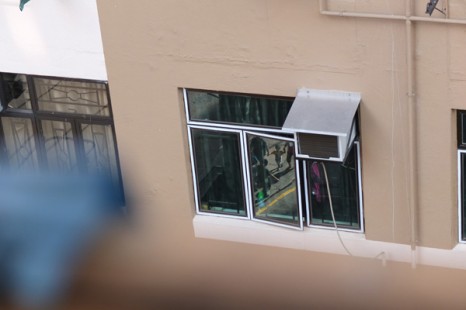
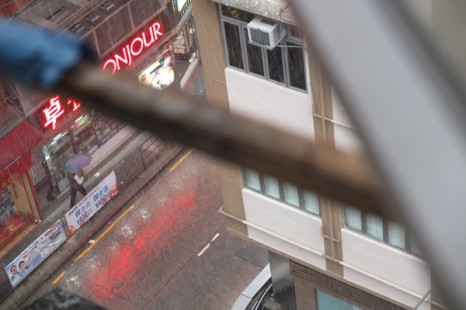
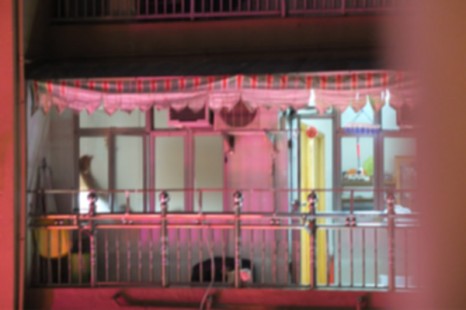
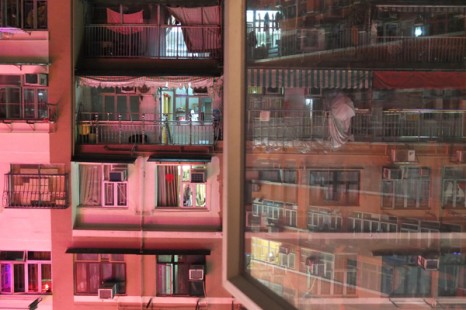
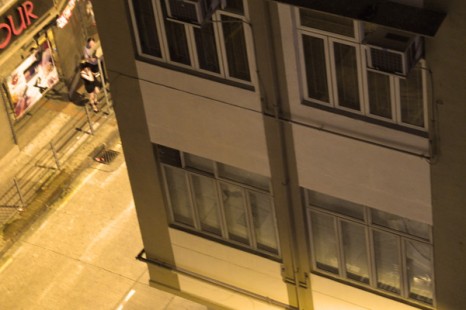
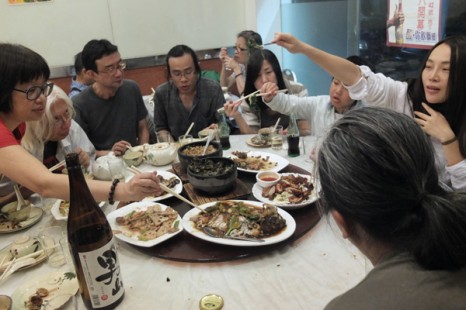
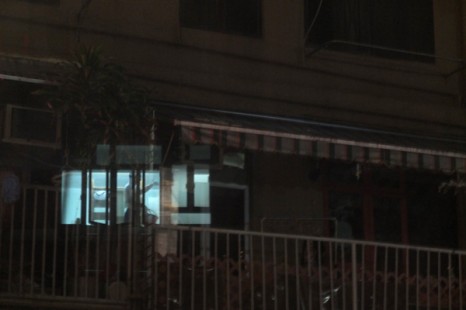
for rene, wendy, small O and rancière’s translator steven
The waiting room of the Department of Motor Vehicles is of course a dismal place: expectedly generic cream-coloured walls, empty except for an L.E.D. number call board and the state logo plaque, a television in the corner and a single formica counter top with ball-point pens on chains attached to it. The rows of chairs are arranged in two directions, presumably for maximum television visibility, but most people look down at mobile phones anyway, or stare into space somewhere beyond the range of the television set.
But today it is an exciting scene to return to, and waiting vacuously feels like a nostalgic act. It looks exactly the same as it did when I came here many years ago, the same bureaucratic cream wall for the same bureaucratic procedure. And for all it’s clichédness, i’ve missed the variety of colour presented behind all that blankness of expression that can only be witnessed in North America. There are probably as many planets and cultures here as there are individuals in the waiting room, but they’ve cleverly staggered the numbering system so that we don’t examine things too linearly. An Asian boy wearing a shiny black down jacket sits down next to me, his transparent document folder neatly organised with all the required paperwork. He doesn’t have to wait too long, and when his number is called I feel the surprise in the black-rimmed eyeglasses slouched on his nose as he walks away. There is a bearish old man who inches across the room with a walker, but his loud, craggy voice with a strong southern accent (enough to satisfy Michael) flirts with the DMV employee like a slick, young stud; other people in the waiting room smile with their heads down. Everyone is polite.
A skinny, stereotypically troubled looking girl (black eyeliner) wears a sleeveless short dress and lazily kicks her three bags——two black and one teal with an E.T. airbrush print on one side——on the ground in front of her as she moves up the queue. A mother and her two daughters, all dressed in black, wait seated together in the row in front of me. The girls take turns using their iPhones or handheld mirrors to check themselves in preparation for having new ID photos taken. Mother gets up at one point to remind the DMV employee to replenish the toilet paper in the women’s restroom and upon her return, says to the girls, “Well…that’s taken care of.”
Beyond a staggered numbering system of waiting, it is difficult to know whether or not we exist in the same time-space. How did you assume that there was a consensual notion of reality? When could we have used the word “us”? For all our attempts to describe it so, how do we know a relation?
My thoughts move from the backs of people’s heads through to the ninja movie on TV. Flying black-clad zombies are pierced by tips on how to save money and political campaign advertisements. There aren’t any plants here. The mini-blinds along the windows are all open to differing degrees. It’s cloudy outside.
Attention diverts to my own electronic devices now, too. I brought the silver and black mobile phone you left when you moved away. I put my SIM card in it and suddenly our lives are mingled into one interface, except that much of mine is sharpened into little rectangles of an unrecognised encoding. Bureaucracy, an organised form of protectionism, just as easily renders us illiterate as it claims efficiency. For the same reason it is not possible to delete the folder of your text messages, so these few months of your life stay stuck in my hands, another life in another city not here, amidst 60 odd foreign faces at the Department of Motor Vehicles. Everyone looks bland here, but somehow it makes certain relations all the more apparent, and I feel close to you somehow, looking inside-out. I wish you were here to pass the time with me, to run errands together and wait in line and make bureaucratic procedures intimate, like bitter jokes about getting married and having kids.
These are momentary islands of waiting for another radical shift of the senses. Waiting is like insurance for belongingness, and realising now that I’ve missed you all this time I feel a closeness that only occurs in distance. not sure whether I prefer it this way or not.
I ask the attendant behind the computer how long the wait is. “That’s the question of the day”, he quips, and of course we both know that we can never really know how long we have to wait. Ask how much work we can get done in an interim period, or ask how a simple quip and come-back rides us through the day. Ask a slippery American tongue, ask for a decade. When I asked her once about love she said she would choose the option that gave the most possibility. But even no is a possibility. So I try not to count too much.
Posted by 丫 | reply »What can a phrase such as ‘natural course’ mean anymore in a time of such intense production?

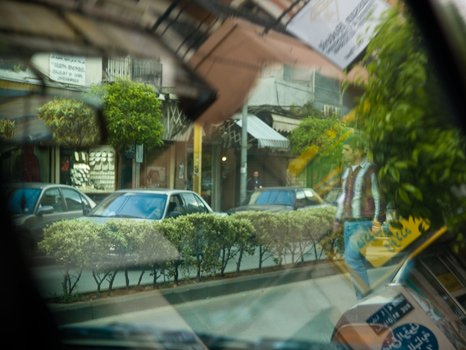
At one point during one of our discussions, Jad mentioned something about the need to build systems and structures so that we can break free from them. At the time i did not agree so much, perhaps out of mere exhaustion (the dialectic), and maybe also there has just always been some part of me that desires to find out how far we can just let things go, or to understand the limits of tolerance.
Phasing works in a similar way, though taking a walk in the city makes a clean set of variables into a dirty game. The phase is an easy, fun experiment; it breaks out of itself predictably but still fascinating to listen to — self-contained by reception. But it seems difficult to consider any form of reality anymore in terms of such structure; what is always lies next to and around itself, everything is multiple. Perhaps it’s simply a poor understanding of mathematics, but I never know how to discern exponentiality from noise. Circling now (the dialectic), it’s another form of fascination — like listening to sound upon sound. Or maybe it’s simply the idea of being attentive to the things that have always been there.
This is an audio recording combining several journeys traced from an original route shared by Maral Der Boghossian, who has visited her father’s shop in Bourj Hammoud two to three times a week for over 25 years. At the time of this writing, not a single participant after Maral has been able to successfully follow the audio to reach the shop, and this reveals certain weaknesses in the structure of the game, but I guess it’s also just letting things follow their natural course.
//
Participants in the recording: Maral Der Boghossian, Jad Baaklini, Paul Gorra, George Haddad, Christophe Katrib (accidentally powered off), Céline Khairallah, Lynn Kodeih, Fotini Lazaridou-Hatzigoga, Lina Sahab and the blacksmith around the corner from the tree that Maral’s grandmother planted some 40 years ago.

April 2011, Beirut
Posted by 丫 | more »samples, what to say
Zürich night
Photo courtesy of Nic Shepherd
Some 15 minutes after having been abandoned at the Perla Mode by an American living in Zürich, I found him again at another opening at a small exhibition space called Les Complices. He made some comment about how I was typically Canadian because of the desire I expressed (which admittedly had structured my last 5 years) to keep going out rather than back to North America. I had not assigned value to my statement, and in my view it could indeed be taken as a lack of control and capriciousness. The space, which had a DJ playing, was a queer art space. I was not sure if my jocular, drunk brotherness was appreciated, and I was in the mood to joke. Out front one of the drunk women, who turned out to be a Canadian from Montreal, tried to convince her acquaintances to go out to a non-gay place to dance. She appeared to be quite drunk, and unless I was mistaken, the other two were not very fond of her. She had pimples. The other two returned to their friends inside and I was left, so she asked me and I thought, why not, I’d like to go dancing. We walked arm in arm down the street to a place right on Langstrasse. She joked with the bouncer who tried to remain stern, they were obviously familiar with each other, and it made me feel that this was a small town. Inside it was hip hop night, and various large men rocked back and forth in the red velvet surroundings. She knew someone (although they claimed they hadn’t known each other before) and they began talking. She asked me to buy her a drink, but I really had no money on me. This other girl seemed to be looking for someone to go home with. They asked me if I wanted to fuck, said that it was what everyone in the room wants. I joked that I was a virgin and the girl believed me, appeared to take pity on me, which made me uncomfortable – when I retracted the statement she asked me what kind of lover I was. I motioned to some of the large men standing near the turntables “maybe they want to fuck.” She considered this and went to see about it. When the lesbian’s back was also turned I used the opportunity to slip out the front door with my backpack on. I walked home along the vacant street car lines. I kept thinking of the girl’s sad expression when she said she came to the bar quite regularly, but no one had interest in fucking her. It made me kind of sad too.
[courtesy of Michael Eddy, October 2009]
Posted by secretary | reply »to find and not find the centre of things, all things aside
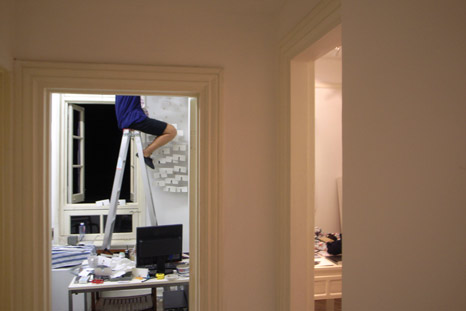
 above: putting up the exhibition (photo by 高灵 Gao Ling); below: walking back after finishing the installation | 上海 shanghai,2009年9月
above: putting up the exhibition (photo by 高灵 Gao Ling); below: walking back after finishing the installation | 上海 shanghai,2009年9月
i am sorry. time is everything.
cannot go there, too much or too little, traveling, hanging there, a collection, hanging on. i seem to have an affinity for stories of people getting lost, perhaps a bit too direct a reference yet were i to introduce myself to you as that one who liked to find this little thing in the street it perhaps would remain too ridiculously nebulous.
direct.
direction.
we would have been looking in the wrong direction to go astray, to find the beside. aside, as in put in reserve, for future use, the collection of objects for which we may find value or function at another time. we never know what will become useful in the end, or the lessons come too late, i feel the top of her head and wonder what positions i layed in as a child, what positions i moved in sleep, next to you or dreaming without you. we cannot always think so functionally, in love and in war. i don’t strategize very well. but we may very well have a hunch.
a hunch is an open space of time, a forethought without expectation, like a collection of random things for which we may find use later. i suppose it could be important to figure out how to make use of them, but perhaps their being together could be enough. find meaning beyond use value, a cabinet of curiousities, our collection of oddities.
that’s the thing i’ve been missing lately. to take time for my collection of oddities, to try to go back to a certain kind of objectivity without expecting too much. i have a hunch. perhaps i was looking in the wrong direction and now find myself lost, a story that i liked to hear, her voice in two languages on loop. it’s my own aside that is now addressed to you, without letting the other characters hear, a story shared without knowing if anyone is listening. you, dear audience member or director, the lights are shining so bright…i cannot see if you are out there.
Posted by 丫 | reply »